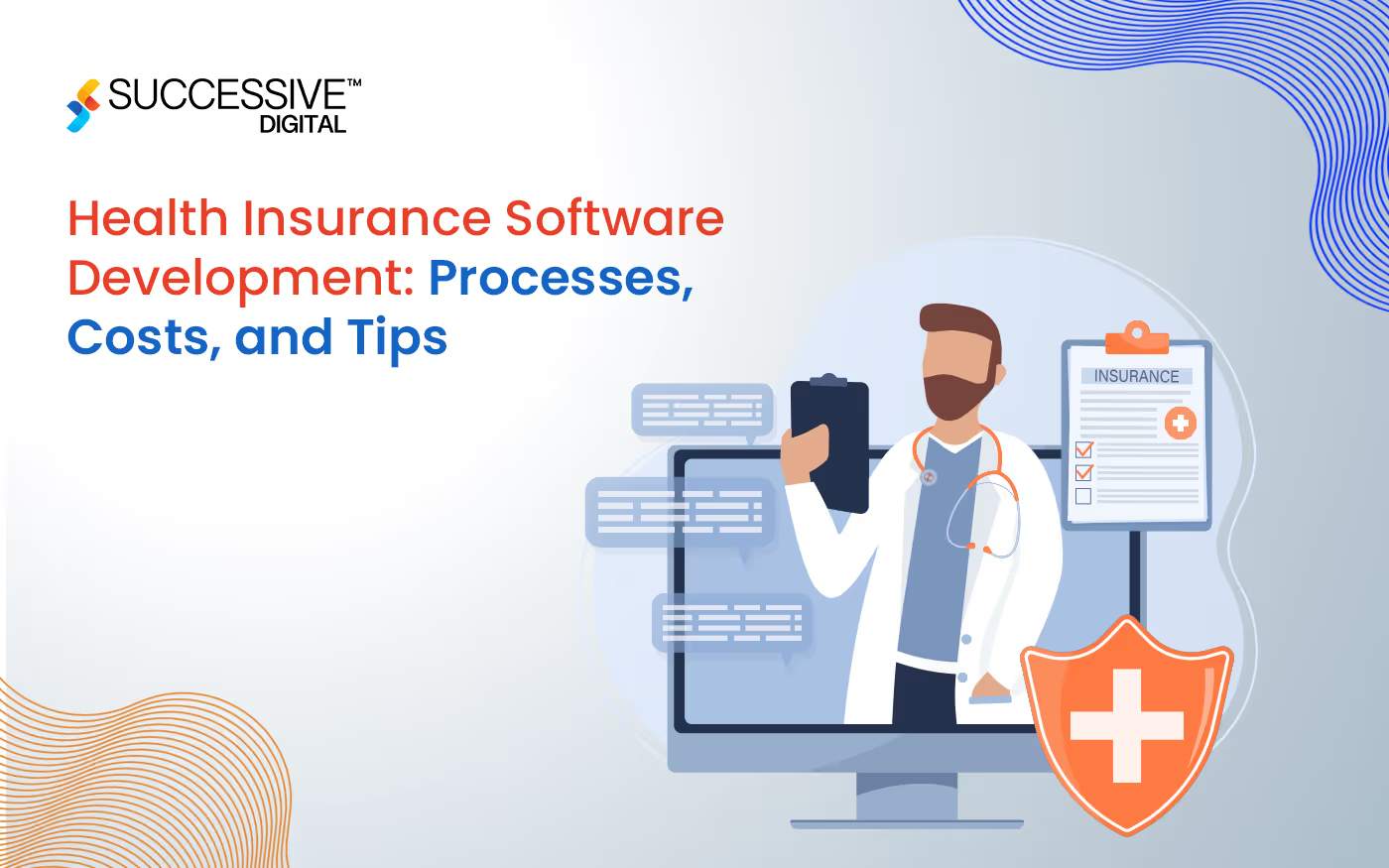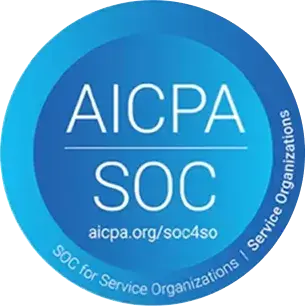Online healthcare services have risen significantly in recent years, especially after the changes that occurred post-COVID-19 pandemic. In fact, it is expected that the health insurance market will surpass $4,475 billion by 2026, projecting a 4.4% CAGR. Hence, we can foresee the shifted dynamics towards digital transformation in healthcare across all fields, such as medical records, hospital management, billing & payment, telehealth, and last but not least, medical insurance.Various key players in the healthcare industry, such as patients, doctors, and health insurance companies, are leveraging digitalization to redefine the way hospitals, insurance providers, and patients interact with each other. Consequently, insurance companies are increasingly turning to health insurance app development services to transform how patients navigate the complexities of health insurance.With health insurance software development, insurance companies and healthcare providers can improve the efficiency of their insurance-associated workflows. Which, in turn, improves customer experience via digital software solutions. The health insurance companies are achieving this by transforming the legacy claim management and the insurance system with an automated all-in-one solution.
Why Go for a Robust Health Insurance Software Development?
Health insurance software solutions are essential in streamlining and assisting healthcare businesses and medical services in the growing digital world. Built on agile technology, it provides interoperability and connects enterprise-wide medical systems seamlessly, delivering scalable transaction processing. Not to mention, healthcare is one of the fastest-growing sectors and is prone to data breaches and cyber-attacks. Understanding the latest trends in evolving technology is essential to help you stay ahead of the competitive curve. Technology-driven innovation could lower healthcare costs and bring new medical advances, potentially generating $350-$410 billion in annual value by 2025 from the projected $5.34 trillion healthcare spending.
What are the Types of Health Insurance Software
Health Information Exchange (HIE) Software
HIE software ensures the mobilization of healthcare information electronically across a community or hospital system, including doctors, nurses, pharmacists, other healthcare providers, and patients. It helps improve the speed, quality, safety, and cost of health insurance software solutions.
Underwriting Software
Insurance underwriting and rating software enables insurers to efficiently process underwriting submissions with automation. It involves a thorough analysis of an individual's medical records and calculates the premium to be charged for insurance.This software provides insurance companies with the patient's medical and insurance history. With the integration of AI predictive analytics technology, you can eliminate the risk of human error.
Health Insurance Claims Processing Software
This software helps process the health claim process request from a policyholder to avail of the coverage under a health insurance policy. It involves a set of procedures to be followed for the settlement of the claim.AI and ML algorithms can streamline the process of healthcare insurance claims with fast and careful of each claims. Hence, it can help identify false claims, prevent fraud, and increase accuracy.
Policy Management Software
Health Policy Management System (HPMS) refers to the end-to-end policy administration system for retail health products. With this centralized policy management software, healthcare insurance companies can author, edit, and publish policy documentation across the entire organization. Moreover, this software involves a complete policy life cycle with steps such as:
- Product Setup
- Setting Quotes
- Policy Issuance
- Renewal Process
- Premium Billing
- Underwriting Process
- Claim Management
Medical Billing Software
Medical billing software covers the expenses of medical treatments and/or services and allows healthcare service providers to streamline and automate the billing process. With this software, you can also improve reimbursement rates, optimize revenue, and sustain the business’ financial health. Also, it automates the creation, sending, and tracking of invoices, helping in financial management.
Compliance Monitoring Systems
Compliance monitoring tools check the system and control healthcare services to ensure the required standards and regulations are met. These tools assist healthcare providers with a comprehensive framework refined with AI/ML algorithms to cover the various aspects of compliance needed for effective and secure health insurance management.
Health Insurance Portals Marketplaces
These are the online platforms that simplify the process of finding and enrolling in health insurance. It includes all required information of the health insurance form policy coverage and premium quotes to terms & conditions of the policy. These platforms make it easy to compare different policies in one place. They are in high demand for ease of use, customer support, and seamless financial assistance.
Key Features of Health Insurance Software Development
In health insurance software development, leveraging the latest technologies and trends to develop key features is essential. Here, we have explained the necessary and advanced features that set modern health insurance software apart from the competitors.
Features Set for MVP Version of the Health Insurance Software
- User Profile
Develop a secure, comprehensive user profile system to make it easy for users to access their information from any device, anywhere.
- Health Insurance Policy
Ensure that health insurance policies are transparent and tamper-proof, building trust and security.
- Health Insurance Plans Information
Integrate an AI-driven recommendation engine to suggest personalized health insurance plans based on user data and preferences.
- In-app Payment Gateways
With a robust, PCI-DSS compliant payment gateways support, you can incorporate multiple currencies and payment methods, including digital wallets, making transactions a breeze.
- Document Scanner
You can utilize Optical Character Recognition (OCR) technology, allowing users to scan and digitize documents directly within the app and simplify paperwork.
- Push Notifications
With AI/ML algorithms, you can send smart push notifications that predict user needs and provide timely updates and reminders.Note: We understand that incorporating intelligent technology into the features above can raise the overall cost of the MVP version of a health insurance software solution. However, you can achieve the same level of efficiency, user-friendliness, and security in a more cost-effective way by partnering with an experienced healthcare app development company. Such a company will have the expertise to utilize these technologies smartly and efficiently, optimizing resources and reducing costs while maintaining high standards of quality.
Advanced Features of Health Insurance Software Development
- Claim Management
Develop a robust claim management system using AI and RPA that can automate claim processing, reduce errors, and speed up resolutions, making claim management efficient and hassle-free.
- Real-Time Information
Ensure real-time data analytics and visualization tools to provide users with up-to-the-minute information on their policies, claims, and more.
- AI-driven Chatbots
Implement advanced AI-driven chatbots powered by NLP to offer 24/7 customer support, handle complex queries, and ensure transactions.
- Payment Gateway Integration
Ensure seamless integration with leading payment gateways using APIs, allowing for quick and secure transactions while providing a smooth user experience.
- EHR Integration
Integrate your health insurance software solutions with EHR systems using HL7 and FHIR standards to ensure interoperability and comprehensive health data access.
- Multi-factor Authentication
Enhance security with multi-factor authentication (MFA) methods, including biometrics, safeguarding user accounts and sensitive information.
- Media Sharing
Enable secure media sharing capabilities with end-to-end encryption, allowing users to share medical reports, images, and documents safely.
Compliance Requirements for Health Insurance App Development
- HIPAA
HIPAA protects the privacy and security of individuals' medical information, ensuring that health insurance apps handle PHI securely. Which, in turn, maintains patient confidentiality and prevents unauthorized access.Want to know how you can build an application fully protected with HIPAA, read our blog on HIPAA compliant healthcare app development, to know its process, features, and pitfalls.
- GDPR
By following GDPR for health insurance app development, you can ensure your health insurance apps comply with strict data protection and privacy standards for EU users, including obtaining explicit consent and enabling users to control their data.
- HITECH
With HITECH, you can strengthen the enforcement of HIPAA rules, supporting the adoption and meaningful use of health information technology. Hence, it is helpful to secure EHRs and develop meaningful health insurance apps.
- PCI DSS
When your users are paying insurance premiums through your app, they should feel secure and have built a rapport with your services. Thus, protecting financial data within health insurance apps is essential for safe credit card transactions and payment information. And PCI DSS ensure any in-app payments or financial transactions are secure and compliant with industry standards.
- SOC 2
Consider SOC 2 as your app’s trust certificate, which manages data securely and protects the privacy of clients. It reassures you that the app provider has robust measures in place to keep your data secure and private.
- FHIR
FHIR ensures your health data is shared accurately and efficiently whenever needed. Hence, it is necessary to implement interoperability between different healthcare systems, allowing health insurance apps to integrate seamlessly with various EHR systems.
- HL7
With HL7, you can set the standard for EHR exchange, integration, sharing, and retrieval, ensuring that different healthcare systems understand each other perfectly. For your health insurance app, this means smooth, accurate, and consistent data sharing.
Technologies and Tools to Power Your Health Insurance Software Solutions
CategoryTechnologies/ToolsFront-end TechnologiesHTML5, CSS3, JavaScript, React.js, Angular, Vue.jsBack-End TechnologiesJava, Python, Node.js, Ruby on Rails, Spring Boot, Django, Express, RailsDatabase TechnologiesPostgreSQL, MySQL, MongoDB, Cassandra, RedisCloud and DevOpsAWS, Google Cloud Platform, Microsoft Azure, Docker, Kubernetes, Jenkins, GitLab CI/CDAPIs and IntegrationRESTful APIs, GraphQL, Kong, AWS API GatewaySecurityOAuth2, JWT, SSL/TLS, AES, Spring Security, Passport.jsData Analytics and ReportingHadoop, Spark, Tableau, Power BIAI and Machine LearningTensorFlow, PyTorch, scikit-learn, NLTK, SpaCyMobile App Development TechnologiesiOS (Swift), Android (Kotlin), React Native, FlutterMonitoring and LoggingNew Relic, ELK Stack (Elasticsearch, Logstash, Kibana), Splunk
How to Develop a Complete Health Insurance Software Solution?
Key Consideration for Health Insurance Software Development
- Data Confidentiality and Privacy
Only the rightful owner should have access to health data. Therefore, health records should be kept private and safe with strong encryption, access controls, and privacy policies.
- Uptime and Reliability
An app that manages health insurance needs to be available and reliable around the clock. Downtime can be more than an inconvenience; it can delay critical processes like claim submissions and access to important health information.
- Regulatory Compliance
Regulatory compliance is a quality assurance badge that reassures users that the app is trustworthy and follows best practices to protect their sensitive information.
- Interoperability and Integrations
A health insurance app must integrate seamlessly with various healthcare systems, EHRs, and other relevant platforms. This interoperability ensures that data flows smoothly between systems, providing users with a holistic view of their health information.
- Big Data Analytics
Leveraging big data analytics helps improve services and predict trends. Analyzing large datasets can provide insights into claim patterns, user preferences, and potential areas for service improvement, ultimately enhancing the user experience.
What is the Process of Health Insurance Software Development?
To ensure the comprehensive social, mental, and physical well-being of the patients, the healthcare industry requires robust health insurance software solutions. With minimal to zero room for errors, they should enhance the efficiency and security of the insurance process. Read our blog on How AI in Healthcare App Development Transforms The Future of Medicine to know how you can make the most of healthcare software solutions.
- Planning
Health insurance software development involves a complex and challenging process that requires careful planning and consideration that needs to be taken into account. Consequently, it is crucial to have a comprehensive understanding of the various components involved for a clear roadmap for the development process and to help navigate the complexities more effectively.
- Requirement Gathering
The development process of a health insurance app, like any mobile application, follows a structured approach. It begins with meticulous planning, which involves defining the app's objectives, target audience, and core features.
- Designing
This is followed by the design phase, where UI/UX designers create an intuitive and user-friendly interface. Security and compliance checks are integral at this stage to ensure the app adheres to relevant regulations and protects user data.
- Development
Backend development involves setting up servers, databases, and APIs to support the app's functionality, while feature implementation includes integrating essential components like policy management, claim submission, and customer support.
- Integrations
Once the core functionalities are in place, secure payment integration is essential to ensure premium payments and other financial transactions. Selecting the appropriate tech stack is crucial for ensuring the app's performance, scalability, and maintainability. Developing an MVP allows for initial testing and feedback, which helps refine the app further.
- Testing
Thorough testing ensures the app is free from bugs and provides a seamless user experience. Post-launch, an ongoing commitment to user satisfaction through regular updates, support, and feature enhancements is vital to maintaining the app's relevance and effectiveness in the competitive health insurance market.
Required Team Structure for a Health Insurance App Development
Developing a comprehensive and fully functional health insurance app requires a multidisciplinary team of skilled professionals, each bringing their unique expertise to the table.By assembling an experienced team of healthcare app developers, you can ensure that every aspect of the health insurance app development process is covered, from project management and design to quality assurance. This comprehensive approach helps in delivering a high-quality, user-friendly, and secure health insurance app.The key roles involved in this process include:
- Project Manager
- Business Analyst
- Solution Architect
- UI/UX Designer
- Backend Developer
- Mobile Developer
- QA Engineer
How Much Does Health Insurance Software Development Cost?
We can define the health insurance software development cost within the 3 levels of complexities:Complexity LevelExplanationDevelopment TimeDevelopment CostSimple Complexity
- Basic features and minimal integration
- Typically include fundamental functionalities
- Fewer features
- Less complex architecture
3 to 5 months $60,000 to $80,000Medium Complexity
- More advanced features
- More intricate UI/UX design
- Enhanced security measures
- Integration with third-party services
- Additional features and integrations needed
6 to 9 months $80,000 to $150,000High Complexity
- Sophisticated features and extensive integrations
- Comprehensive policy management systems
- Advanced analytics
- AI-driven recommendations
- Complex backend infrastructure
- Stringent security and compliance requirements
10 to 15 months $150,000 to $250,000The cost of developing a healthcare insurance application will also depend on the type and location of the development team. Also, factors such as features, platform selection, security and compliance, and app maintenance play crucial roles in health insurance software development.Read our blog on the mobile app development cost to learn about the cost-driving factors.
Successive Digital as Your Partner Healthcare Software Development Company
Do you want end-to-end healthcare app development services that manage comprehensive tasks from design to maintenance? You can count on our expertise and competency to accurately assess your requirements and develop the optimal product for market success.Successive Digital is a trusted tech partner for healthcare insurance software development, ensuring seamless deployment and maintenance of your application, from conceptualization to design and development. With our decades of experience, we have successfully deployed 300+ healthcare solutions. Let’s take an example of the innovative digital healthcare platform we developed for our client, CuraPatient…With the aim to deliver a seamless and intuitive experience for their users and enhance patient care and outcomes, we developed a responsive web-based platform. It makes it easier for residents to seek medical assistance and for healthcare providers to communicate with patients. As a result, our healthcare solution helped our clients in reducing downtime and response times.We are ready to help your business with our technology-driven healthcare application services. Do you want to develop a health insurance software? Contact us today!
.avif)










.jpg)









